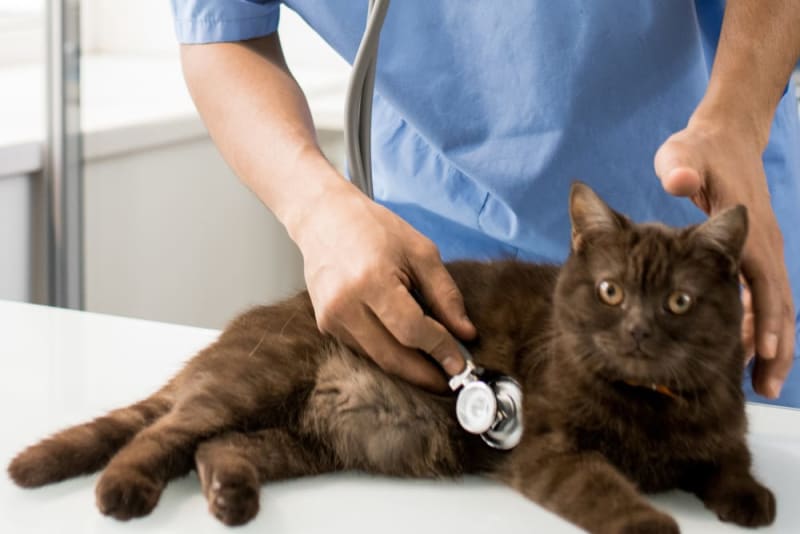The Enigma: Heart Murmur in Cats
A heart murmur in cats refers to an abnormal sound heard during a veterinary examination when listening to the cat’s heart with a stethoscope. Understanding heart murmurs in felines is crucial for their overall health and well-being. In this article, we will delve into the causes, diagnosis, types, common heart diseases associated with murmurs, treatment options, and management strategies for cats with heart murmurs.

Understanding Feline Heart Murmurs
Heart murmurs in cats can be caused by various factors, including congenital heart defects, acquired heart diseases, and other potential causes. Congenital heart defects are present at birth and can lead to abnormal blood flow within the heart. Acquired heart diseases, on the other hand, develop over time and can be caused by conditions such as high blood pressure or heart muscle diseases. Other potential causes of heart murmurs in cats include anemia, hyperthyroidism, or heartworm disease.
Diagnosing heart murmurs in cats involves a thorough veterinary examination, where the veterinarian listens to the heart sounds using a stethoscope. Additional diagnostic tests, such as echocardiography or X-rays, may be necessary to determine the underlying cause and severity of the murmur. Heart murmurs are graded based on their intensity, with grade I being the mildest and grade VI being the most severe.
Heart murmurs in cats can present with various symptoms and signs. Visible signs may include difficulty breathing, coughing, or a bluish tint to the gums. Behavioral changes, such as decreased activity or lethargy, may also be observed. Other potential symptoms of heart murmurs in cats include weight loss, poor appetite, or fainting episodes. It is important to note that some cats with heart murmurs may not exhibit any outward symptoms, making regular veterinary check-ups crucial for early detection.
Types of Heart Murmurs in Cats
There are two main types of heart murmurs in cats: innocent heart murmurs and pathological heart murmurs.
Innocent Heart Murmurs
Innocent heart murmurs, also known as functional or benign murmurs, are common in young cats and are not associated with any underlying heart disease. These murmurs are typically low-grade and do not cause any harm to the cat’s health. They often resolve on their own as the cat grows older. Innocent heart murmurs are usually detected during routine veterinary examinations and do not require specific treatment.
Pathological Heart Murmurs
Pathological heart murmurs are associated with underlying heart diseases and require further investigation and treatment. These murmurs are often higher in intensity and may be accompanied by other symptoms. It is important to differentiate pathological murmurs from innocent murmurs to determine the appropriate course of action.
Specific heart diseases commonly associated with pathological heart murmurs in cats include hypertrophic cardiomyopathy (HCM), mitral valve disease (MVD), dilated cardiomyopathy (DCM), heartworm disease, and endocarditis. Each of these conditions requires specific diagnostic tests and treatment approaches.
Common Heart Diseases Causing Murmurs in Cats
Hypertrophic Cardiomyopathy (HCM)
Hypertrophic cardiomyopathy is the most common heart disease in cats and is characterized by the thickening of the heart muscle. This condition can lead to the obstruction of blood flow and the development of heart murmurs. Symptoms of HCM in cats may include difficulty breathing, coughing, lethargy, and sudden collapse. Diagnosis involves echocardiography and other imaging tests. Treatment options for HCM in cats include medication to manage symptoms and improve heart function, as well as lifestyle modifications such as reducing stress and maintaining a balanced diet. Regular monitoring and check-ups with a veterinarian are essential for managing HCM in cats.
Mitral Valve Disease (MVD)
Mitral valve disease occurs when the mitral valve, which separates the left atrium and left ventricle, becomes diseased or damaged. This can lead to the backflow of blood and the development of heart murmurs. Symptoms of MVD in cats may include coughing, difficulty breathing, and exercise intolerance. Diagnosis involves echocardiography and other imaging tests to assess the condition of the mitral valve. Treatment options for MVD in cats include medication to manage symptoms and slow disease progression. In severe cases, surgical intervention may be necessary to repair or replace the damaged valve. Regular monitoring and check-ups with a veterinarian are important for managing MVD in cats.
Other Heart Diseases Associated with Murmurs
In addition to HCM and MVD, other heart diseases can cause murmurs in cats. Dilated cardiomyopathy (DCM) is characterized by the enlargement of the heart chambers, leading to weakened heart muscle function. Heartworm disease, caused by the parasitic infection of the heart, can also result in murmurs. Endocarditis, an infection of the heart valves, can cause murmurs as well. Each of these conditions requires specific diagnostic tests and treatment approaches tailored to the underlying disease.
Treatment and Management of Heart Murmurs in Cats
Medications and Therapeutic Options
Medications may be prescribed to manage underlying heart diseases and alleviate symptoms in cats with heart murmurs. These medications can include beta-blockers, diuretics, and ACE inhibitors. Lifestyle modifications, such as reducing stress and providing a balanced diet, can also help improve the overall well-being of cats with heart murmurs. In some cases, surgical interventions, such as valve repair or pacemaker implantation, may be necessary.
Monitoring and Regular Check-ups
Regular veterinary visits are crucial for monitoring the progression of heart murmurs and assessing the effectiveness of treatment. During check-ups, the veterinarian will listen to the cat’s heart, perform diagnostic tests if necessary, and adjust the treatment plan accordingly. In complex cases, collaborating with a veterinary cardiologist may be recommended to ensure the best possible care for the cat.
Enhancing Feline Well-being
Creating a stress-free environment is important for cats with heart murmurs. Providing a calm and quiet space, away from loud noises and excessive activity, can help reduce stress and promote overall well-being. Regular exercise, tailored to the cat’s abilities and limitations, can also be beneficial. Additionally, maintaining good dental health is important, as dental infections can potentially worsen heart conditions in cats.
Frequently Asked Questions (FAQs)
What are the common signs of a heart murmur in cats?
Common signs of a heart murmur in cats include difficulty breathing, coughing, lethargy, and changes in appetite or weight.
Can heart murmurs in cats be cured?
Heart murmurs themselves cannot be cured, but the underlying heart disease causing the murmurs can be managed with appropriate treatment.
How long can a cat with a heart murmur live?
The lifespan of a cat with a heart murmur depends on the underlying heart disease and the effectiveness of treatment. With proper management, many cats with heart murmurs can live a good quality of life for several years.
Are heart murmurs in cats hereditary?
Some heart diseases that can cause murmurs in cats have a genetic component, but not all heart murmurs are hereditary. It is important to consult with a veterinarian to determine the underlying cause of the murmur.
Can heart murmurs in cats be prevented?
While some heart diseases may not be preventable, maintaining a healthy lifestyle, providing a balanced diet, and regular veterinary check-ups can help detect and manage heart conditions early on.
Is it safe to spay/neuter a cat with a heart murmur?
The safety of spaying/neutering a cat with a heart murmur depends on the underlying heart disease and the recommendation of the veterinarian. It is important to discuss this with a veterinarian to assess the risks and benefits in each case.
Can heart murmurs in cats be detected without a stethoscope?
Heart murmurs are typically detected during a veterinary examination using a stethoscope. It is not possible to detect a heart murmur without proper equipment.
Are there any natural remedies for heart murmurs in cats?
Natural remedies alone are not sufficient for managing heart murmurs in cats. It is important to consult with a veterinarian for appropriate medical treatment and management strategies. However, certain lifestyle modifications, such as providing a stress-free environment and maintaining a balanced diet, can support the overall well-being of cats with heart murmurs.
Should I restrict my cat’s activity if it has a heart murmur?
The level of activity restriction depends on the severity and underlying cause of the heart murmur. It is best to consult with a veterinarian who can guide appropriate exercise and activity levels for your cat.
How often should a cat with a heart murmur be monitored by a veterinarian?
Regular monitoring is essential for cats with heart murmurs. The frequency of veterinary visits will depend on the severity of the condition and the treatment plan established by the veterinarian. Typically, cats with heart murmurs should have check-ups every 6-12 months or as recommended by the veterinarian.
Conclusion:
Understanding heart murmurs in cats is crucial for their overall health and well-being. By recognizing the causes, types, and associated heart diseases, as well as implementing appropriate treatment and management strategies, cat owners can help improve the quality of life for their feline companions. Regular veterinary check-ups and collaboration with a veterinary cardiologist are essential for proper diagnosis, monitoring, and treatment of heart murmurs in cats. If you suspect your cat may have a heart murmur or any related symptoms, it is important to consult with a veterinarian for a thorough examination and guidance.




